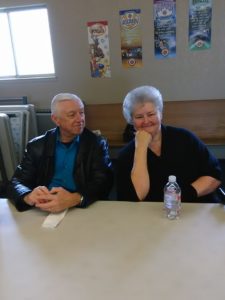By: Ron Richardson, B.C.E.T.S., F.A.A.E.T.S., ICISF Member Since 2000
 The statement is a shortened version of an insult hurled at Jesus when he was crucified on a cross. The actual words recorded were, “he saved others, let him save himself.” (Luke 23.35) These days the taunt might be, “you are a trained and experienced crisis interventionist. You have helped others. Now help yourself.” But can you effectively help yourself?
The statement is a shortened version of an insult hurled at Jesus when he was crucified on a cross. The actual words recorded were, “he saved others, let him save himself.” (Luke 23.35) These days the taunt might be, “you are a trained and experienced crisis interventionist. You have helped others. Now help yourself.” But can you effectively help yourself?
In 2017 we learned my wife had the beginning stage of dementia caused by strokes. Her reasoning ability slowly declined until at the end of 2019 when her health took a sudden turn for the worse. Her mental health rapidly deteriorated and I had to place her in hospice care. At that point, during the last six months of her life I experienced the typical reactions of shock, disbelief, anger, denial, remorse, anticipatory grief, and eventually reconciled with the fact that Mary Ann would soon die. All the while I was “bargaining” with doctors over her qualify of care, forced to make the tough decisions for her medical care, and bargaining with God (this isn’t fair). I often struggled between emotion and logic and I knew I must not make decisions when I was emotional.
I sometimes found myself thinking I knew more about what was happening to me emotionally and mentally than the doctor, nurses, and care givers knew. Often, when they tried to say something they thought would be helpful, I felt like I was accommodating their need to believe they were helping. I thought their attempts to help me were inadequate and I desperately wanted to find someone to talk to who had similar training and experience as mine; someone who knew how to help someone like me through my crisis. As I looked back on that experience, I realized that my pride of my CISM education and experience was keeping me from receiving the emotional help I needed.
Following my wife’s death, I kept emotions in check while making her final arrangements. I scanned through CISM materials on grief and coached myself through the first two weeks, reminding myself about the typical timeline of grief responses. But my grieving didn’t always fit the typical timeline we teach. I learned that grief has its own timeline and that we should not consider the typical timeline to be static (set in stone), but unique to the individual.
I finally reached my limit trying to help myself and became desperate to talk to someone. I called my doctor who made a mental health referral. A therapist soon called and I began getting the help I needed. Then a good friend, who has similar training and experience as mine, called from across the country and I was able to talk freely about my grief. Those two calls provided a pathway to finding my sense of balance, giving me confidence to move forward.
Looking back, I realize that my false opinion of my “superior training and experience” was keeping me stuck in heavy grief. It was when I realized I could not help myself that recovery began.
We must recognize the fact that we CISM “physicians” cannot heal ourselves and neither should we try. When our world has been rocked, we need to talk to someone; a therapist, a trusted friend, and talk regularly and openly. Don’t put a timeline on your recovery process. There is no “cookie cutter” formula to get quickly back to a sense of balance so you can go forward with your life. Remember that what you know from your CISM training is excellent and helpful, but the processes are not set in stone. You are unique and will recover your sense of balance in your own time.
On a personal note, I don’t like the word “recovery”. We never really recover from the loss of someone dear to us. I’ve often told friends that to me, grief is like a volcano. It may lie quietly for a while. It may rumble occasionally and sometimes it may erupt without warning. Little by little my good days are beginning to outnumber the bad days and I am fully aware that there will be challenges ahead. When they come, I know where I can get the help I need.
Ron Richardson